Fassenacht (Fastnacht, Karneval, Carneval, Fasching, usw.)
Mardi Gras
Aktuelle Information und tolle Bilder vom laufenden Fassenachtskompagne finden Sie bereits auf die folgende Webseite!
Current information and great photos of the pending Mardi Gras Season can be found on the following website!
Gustavsburger Carneval Club 1947 e.V.: www.gcc-gustavsburg.de
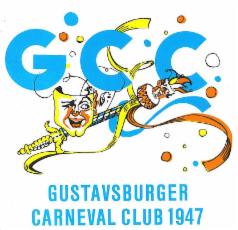
What is German Fassenacht/Mardi Gras/Karneval?
The German Embassy in Ottawa, Canada explains it all very clearly, and in English, on their website: http://www.ottawa.diplo.de/Vertretung/ottawa/en/06/Lifestyle__culture/carnival__seite.html
The following article was found on the above website and is fully accredited to the German Embassy in Ottawa, Canada.
Carnival in Germany - Germans go wild
Carnival in Germany
Carnival is celebrated with greater dedication in parts of Germany than in any, other European country. In Germany, Mardi Gras is also referred to as the fifth and foolish season ('die naerrische Zeit').
It is a time of elaborate parades, masks, balls and election of Carnival king and queen and official madness. The exact time of celebration and the traditions vary from region to region but it generally takes place in early spring, seven weeks before Easter. But in theory it actually starts on the 11th of November at 11.11 a.m, although little more than backstage planning takes place before New Year.
.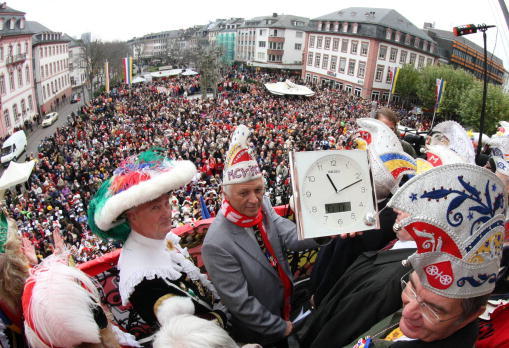 .Bild: Wiesbadener Kurier
.Bild: Wiesbadener Kurier
The festival itself is variously known as Karneval (Rhineland), Fassenacht (Mainz), Fasching (Bavaria) and Fastnacht or Fasnet (South West Germany), and the different names denote totally different forms of celebration.
The chief towns' famous for their Carnival spectaculars are Aachen, Cologne, Duesseldorf, Mainz, Munich and Muenster, but even smaller localities put on their own celebrations, not to mention the many parties held in schools, youth clubs and places of work.
.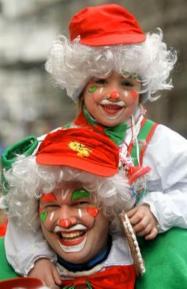 .
.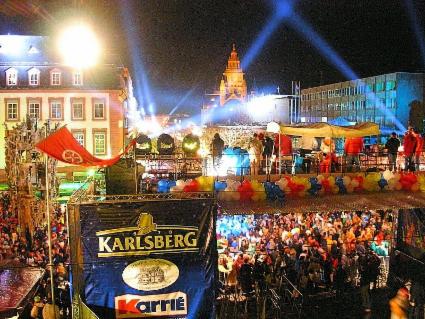 .
.
The humorous carnival speech
The climax of many carnival celebrations in the Rhineland is the humorous speech, the best of which are not read from a script but learned by heart and delivered mostly in rhyming form like a poem from a “Buette” or barrel. The speeches are supposed to be not only funny but clever and up-to-date as well, with plenty of mischievous sideswipes at authority in all its forms. Writing a good carnival speech is an art in itself and many of those who present one spend a year beforehand poring over the manuscript.
The custom harks back to the Middle Ages to what was known as the “right to vent your spleen”. Back then citizens were given license to criticise those in charge once a year. Before long professional carnival speech-givers arrived on the scene. They went from one town to another, honing their skills at the same time. The tradition endures to this day. The speech is usually peppered with satirical remarks and jokes but is supposed to be relevant to current political affairs or at least to the everyday life of the audience.
The German world “Buette” actually means a large container or vat but it can be a washing bowl too. Today the speechmaker generally stands inside or on top of a wine barrel although the carnival associations are always coming up with new variations on the time-honoured theme.
.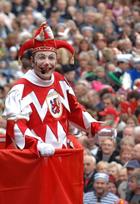 .
.
Carnival in the Rhineland region
Carnival - Crazy, Zany Winter Days
If you visit a town in Germany’s Rhineland or in the southwestern region during the supposedly dark days of winter you’re likely to find the whole place thrown topsy-turvy. That's because the period before Ash Wednesday is known as Carnival or the fifth season.
Carnival - known in German as Karneval, Fastnacht, Fasching, Fassenacht, or Fasnet, depending on the region - has its roots in the spring celebrations of pre-Christian times, when people wore masks to scare away winter spirits and welcomed the rebirth of nature with singing and dancing. Today it is observed mainly in Catholic regions as a season of feasting and fun before the fasting period of Lent.
Organized revelry in the Rhineland
While some localities like Cologne mark the beginning of the season on November 11 at 11:11 a.m., the highpoint always occurs in the six days before Ash Wednesday when everyone from government officials to school children give themselves over to organized revelry. People may be laughing and having a good time, but for the hundreds of Carnival societies in the region, the season of festive sessions, balls and parades is serious business.
The Thursday before Ash Wednesday is known as “women’s Carnival” in some regions. Women literally assume power and symbolically storm the town halls in many places. Men are advised to wear an old tie since the women are liable to cut it off on and compensate the bereft wearer with a kiss.
This particular Thursday is known in other regions as fat or dirty Thursday. The name goes back to the tradition of slaughtering an animal on this day for the last meal before the fasting period. To prevent the fat from going bad people cooked food which was particularly rich in fat or else used the grease for baking.
Sooty Friday gained its name from an old custom according to which children daubed their faces with soot. Fewer festivities are held on this day.
Rose Monday is the climax of the Rhineland Carnival, with huge parades held in n the cities of Cologne, Düsseldorf and Mainz. Millions of people line the streets singing, dancing or just rocking too and fro. The day is not an official public holiday, but few people are expected to show up at work or school.
The parades feature floats that poke satirical fun at politicians and their policies or otherwise comment on the issues of the day. Costumed musicians, dance troupes and mounted guards are also part of the fun.
The History of Carnival in Cologne
Carnival in Cologne is almost as old as the history of the city itself. But the organized carnival celebrated today only dates back 179 years. The Greeks and Romans celebrated cheerful spring festivals in honour of Dionysos and Saturn with wine, women and singing. The ancient Germans celebrated the winter solstice as a homage to the Gods and expulsion of the evil winter demons.
Later the Christians adopted the heathen customs. The period of fasting (Lent) prior to Easter was heralded in by "Fastnacht" or "Karnival" – carne vale = Farewell to meat!
In the Middle Ages, the celebrations of Carnival and masquerades often took on drastic forms, very much to the displeasure of the city council and the church. Ordinances and bans did little to help, the celebration was always wild and spirited.
The boisterous street carnival was extended in the 18th century to include the so-called "Redouten", elegant masked and fancy-dress balls in Venetian style, which were initially the preserve of the aristocracy and the wealthy patricians. In 1736, the first Redoute was held in Cologne in a noble house on the Neumarkt.
Almost 50 years later, Cologne was captured by the French revolutionary troops. But the new rulers allowed the locals „de faire son tour", to hold their carnival parades. The Prussians, who took control a short time later, were stricter, which, however, did not prevent the natives of Cologne from cultivating their Carnival tradition. Carnival was romanticized and became bourgeois. It became organized! With the "Carnival Hero", today’s Prince Carnival, a new idea was also introduced.
In 1823 the "Festkomitee" was founded. On February 10 of that year, Cologne celebrated the first Rose Monday Parade with the motto "Inthronization of the Carnival Hero", as a reminder to the former free imperial city of Cologne.
Following the foundation of the Festkomitee, there was no stopping the people of Cologne, one Carnival society followed the other.
In 1860, the first "Ghost Parade" was held on the evening of Carnival Saturday. Even after the turn of the century, the "founding period" the revolution of Carnival continued. In 1902, the "Ehrengarde" was formed as the accompanying group of the Peasant and Virgin. In 1906, Prince Carnival was given his "Prinzengarde".
Every year the opening of the "Carnival Session" is on November 11 at 11:11 and in the meantime, up to its climax, there are approx. 160 carnival societies, local history societies and district groups in Cologne who will celebrate their home town festival with about 500 sessions, balls and parades.